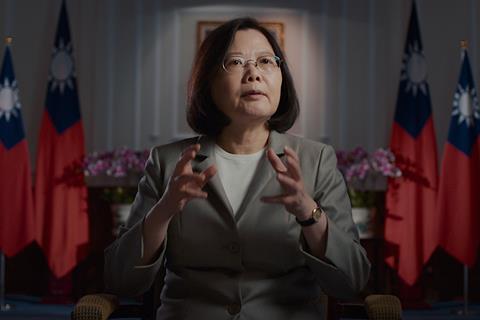Profile of Tsai Ing-wen, Taiwan’s first female president, and her fight on the global stage

Dir: Vanessa Hope. US/Taiwan. 2023. 85mins
With Taiwan’s first female president, Tsai Ing-wen, as its focal point, Vanessa Hope’s compassionate documentary explores the troubled history of a nation trying to establish its autonomy while facing increasing tensions from neighbouring China. Invisible Nation works best as an informational overview, highlighting why Taiwan is not recognised as an independent country by bodies such as the United Nations. Calling itself the Republic Of China, Taiwan lives in constant anxiety that the Communist nation will invade and, although the film is not an especially illuminating portrait of Tsai, Hope makes a convincing case for why Taiwan’s fears should concern the world
Explores the troubled history of a nation trying to establish its autonomy
Screening at IDFA, Invisible Nation is especially timely at a moment when the leaders of China and the United States are engaged in summit meetings — indeed, the documentary is, in large part, about how nations like the US will not support Taiwan’s independence for fear of alienating China. Produced by influential indie maven Ted Hope, director Vanessa Hope’s husband, the picture draws alarming comparisons between the histories of Taiwan and Ukraine, which was invaded by Russia. (Invisible Nation speculates, not unreasonably, that China may be emboldened by Vladimir Putin’s actions.) Expect further festival appearances, which may result in a growing global awareness of this political hotspot.
Tsai became president of Taiwan in 2016, determined to promote the country’s independence from China, which still considers it part of its territory, even though (according to Taiwan’s official website) the Chinese government has “never exercised sovereignty over Taiwan.” Invisible Nation spends some of its 85-minute runtime with Tsai, hearing about her achievements and her backstory. But the documentary primarily explores Taiwan itself, pondering a now-democratic nation that has been ruled by different entities over the years, finally breaking free of the martial law imposed by China’s exiled Kuomintang in the late 1980s. A bevy of scholars, historians, advocates and politicians provide context, explaining the country’s past and uncertain future.
Vanessa Hope, who has directed several documentary features and shorts about China, including 2015’s All Eyes And Ears, takes an unfussy approach to the material, crafting a history tutorial and a presidential portrait with a straightforwardness that is crisp, if a little dramatically underpowered. (Hsu Wei-san’s score occasionally overcompensates, leaning toward sentimental flourishes.) In some ways, the film follows the example of the reserved Tsai, who confesses that being president was never her aspiration — ironically, she is not someone who prefers dealing with myriad people.
Yet she is also a hard-working, no-nonsense type, serving as the tireless spokesperson for a nation that often does not have a platform on the world stage. (For example, when the country competes in the Olympics, it is not allowed to be identified as Taiwan but, rather, Chinese Taipei). China may not officially have authority over Taiwan, but does in the eyes of many around the globe, forcing Tsai to constantly attack those attitudes — all without appearing too provocative and risking incurring the wrath of China (and its far-superior military).
The documentary is especially critical of the US and agencies like the World Health Organization, which frequently side with China in the ongoing dispute. Hope’s talking heads elucidate why such a position is dangerous, speculating that if China succeeds in delegitimising Taiwan’s independence, then the superpower can more easily send in troops to claim the land for itself, resulting in extensive casualties. Additionally, Invisible Nation argues that such an invasion could bolster China’s attempts to control the region, subsequently targeting nations like Japan, and theorises that ignoring Taiwan is akin to turning one’s back on democracy in general.
That message is sobering, although Invisible Nation’s dry presentation sometimes undercuts the urgency. For better or worse, Hope is most interested in educating viewers about a precarious political standoff that too often is overlooked — especially right now, as the war in Gaza dominates headlines. As such, the documentary is a work of earnest advocacy, pleading with viewers to see their stake in Taiwan’s fight. The results may not be gripping cinema, but the passion behind the project is undeniable.
Production companies: Double Hope Films, Seine Pictures, 100 Chapters Productions
International sales: Submarine Entertainment, info@submarine.com
Producers: Vanessa Hope, Ted Hope, Cassandra Jabola, Ivan Orlic
Cinematography: Laura Hudock
Editing: A-Ming Ku, Dave Henry, Siuloku O, Justice Yong
Music: Hsu Wei-san






![The Brightest SunScreen[Courtesy HKIFF]](https://d1nslcd7m2225b.cloudfront.net/Pictures/274x183/3/5/0/1448350_thebrightestsunscreencourtesyhkiff_312678.jpg)















![The Brightest SunScreen[Courtesy HKIFF]](https://d1nslcd7m2225b.cloudfront.net/Pictures/100x67/3/5/0/1448350_thebrightestsunscreencourtesyhkiff_312678.jpg)

